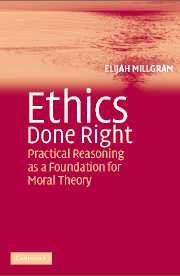Book contents
- Frontmatter
- Contents
- Acknowledgments
- Miscellaneous Frontmatter
- Introduction: The Method of Practical Reasoning
- 1 What's the Use of Utility?
- 2 Mill's Proof of the Principle of Utility
- 3 Does the Categorical Imperative Give Rise to a Contradiction in the Will?
- 4 Reasonably Virtuous
- 5 Murdoch, Practical Reasoning, and Particularism
- 6 Was Hume a Humean?
- 7 Hume on “Is” and “Ought”
- 8 Hume, Political Noncognitivism, and the History of England
- 9 Incommensurability and Practical Reasoning
- 10 Commensurability in Perspective
- 11 Varieties of Practical Reasoning and Varieties of Moral Theory
- References
- Index
9 - Incommensurability and Practical Reasoning
Published online by Cambridge University Press: 12 November 2009
- Frontmatter
- Contents
- Acknowledgments
- Miscellaneous Frontmatter
- Introduction: The Method of Practical Reasoning
- 1 What's the Use of Utility?
- 2 Mill's Proof of the Principle of Utility
- 3 Does the Categorical Imperative Give Rise to a Contradiction in the Will?
- 4 Reasonably Virtuous
- 5 Murdoch, Practical Reasoning, and Particularism
- 6 Was Hume a Humean?
- 7 Hume on “Is” and “Ought”
- 8 Hume, Political Noncognitivism, and the History of England
- 9 Incommensurability and Practical Reasoning
- 10 Commensurability in Perspective
- 11 Varieties of Practical Reasoning and Varieties of Moral Theory
- References
- Index
Summary
Worries about the incommensurability of ends or of values arise when practical reasoning – that is, reasoning directed toward decision or action, contrasted with reasoning that aims only at arriving at belief – seems to run out: the thought that ends or values are incommensurable is prompted by facing a decision in which they must be jointly brought to bear and it is not clear how this is to be done. If the difficulty persists, frustration may give rise to the thought that there is no way to do this, that one cannot, here, reason one's way to a practical conclusion; and that this is because the relevant considerations cannot be measured or weighed against each other. So far, so familiar.
I myself do not know what “values” are; like William Bennett, when I hear the word “values,” I reach for my Sears catalog. So I am going to consider only the incommensurability of ends (or equivalently, as I will claim, the incommensurability of desires), on the supposition that the incommensurability of values is a closely related phenomenon, and that a treatment of the former could, if necessary, be adapted to the latter. “Incommensurability” is a word applied to a number of distinct, though related, phenomena. I will use it, provisionally, to say of pairs (or sets) of ends or desires that one is not more important than another (or the others), and that they are not equally important. And I will restrict myself to the case in which all ends or desires in question are those of a single human being.
I will first show how the worry that ends are incommensurable is framed by a widely shared model of practical reasoning.
- Type
- Chapter
- Information
- Ethics Done RightPractical Reasoning as a Foundation for Moral Theory, pp. 273 - 294Publisher: Cambridge University PressPrint publication year: 2005
- 2
- Cited by

